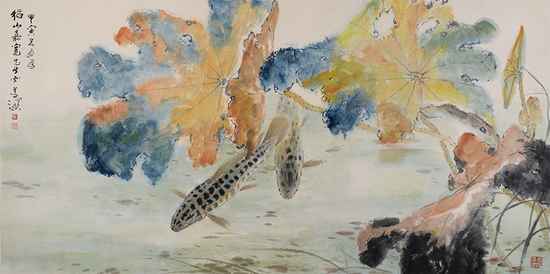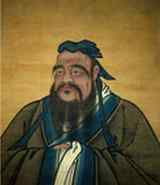“己所不欲,勿施于人”
先秦:孔子
己所不欲,勿施于人
古:仄仄通仄 仄通平平 ◆人【上平十一真】
今:仄仄通仄 仄平平平 ◆人【九文,en,in(ien),un(uen),ün(üen)】
英:Do as you would be done by others.

语出,出自《论语-颜渊篇第二章》。中国古代思想家教育家孔子的名言。承接上文,克己复礼,天下归仁。更加详细的阐述“仁”中的恕道。己所不欲,勿施于人。字面上是说自己所不欲的,莫要施于人。其后句“在邦无怨,在家无怨”中的“怨”字,宜与“求仁得仁又何怨”
【释义】自己不愿承受的事也不要强加在别人身上。
【欲】想做的事
【勿】不要
【施】施加
己所不欲,勿施于人问答:
己所不欲,勿施于人的现实意义
是处理人际关系的重要原则。孔子所言是指人应当以对待自身的行为为参照物来对待他人。 人应该有宽广的胸怀,待人处事之时切勿心胸狭窄,而应宽宏大量,宽恕待人。倘若自己所讨厌的事物,硬推给他人,不仅会破坏与他人的关系,也会将事情弄得僵持而不可收拾。
人与人之间的交往确实应该坚持这种原则,这是尊重他人,平等待人的体现。人生在世除了关注自身的存在以外,还得关注他人的存在,人与人之间是平等的,切勿将己所不欲施于人。
"己欲立而立人,己欲达而达人 .己所不欲勿施于人"如何理解?谢谢.
自己想立足于社会,所以帮助别人立足于社会 自己想要通达进取,所以帮助别人通达进取 自己都不想要的东西,也不强加给别人 ,只是觉得如果头两句把别人放在自己之前的话,那么第三句的“己所不欲”中主语显得有些不够恰当。索性,三句都是以“己”为出发点,来的倒顺畅些
己所不欲,勿施于人句例:
中英句例:
你不会希望任何人在背后议论你,所以己所不欲,勿施于人。
Avoid gossip. You don't want anyone talking about you behind your back, so return the favor.
己所不欲,勿施于人。这就是获得和睦的人际关系的关键。
Wish for the other what you wish for yourself. This is the key to harmonious human relations.
在处理人和人之间的关系时,孔子又提出来“己所不欲,勿施于人”,这句话成为了很多人的座右铭,是很多人做人处事的准则。
In dealing with human relations, Confucius also proposed his pointview: "don't make others do things you don't want to do". It became mottos of many people and the guidelines for their behaviors.
童子军应理解文明的力量。己所不欲,勿施于人。不无故伤害或杀死无害的生物。
Scout understands there is strength in being gentle. He treats others as he wants to be treated. He does not hurt or kill harmless things without reason.
不管是谁,在做决定前都应换位思考,“己所不欲,勿施于人”。
You have to put yourself in the shoes of other people and before you make any decision, consider whether you like this done to yourself.
但是在我方的构成文化中唯一普遍认可的金律便是「己所不欲,勿施于人」(你要人家如何待你,先如何待人)。
The only law that all our constituent cultures would generally recognize is the Golden Rule.
“和而不同”、“亲仁善邻”、“己所不欲,勿施于人”,讲的就是文明和文化多样性中的统一性。
"Harmony in difference", "loving people and treating neighbors kindly" and "never impose upon others what you dislike yourself" all refer to unity in diversified civilizations and cultures.
孔夫子的教导:“己所不欲,勿施于人”、“闻过则喜”是明智的并值得我们遵循。
Confucian teachings such as: “do not do to others as you would not want done to you” and “one should be delighted to hear criticism,” are wise and worthwhile.
在我们长大过程中多少次听到父母背诵这一金科玉律——“己所不欲,勿施于人”?
How many times did we hear from our parents when we were growing up recite the Golden Rule? "Do unto others, as you would like to have done to you."
在中华文明中,早就有“和为贵”、“和而不同”、“己所不欲,勿施于人”等伟大思想。
The Chinese civilization has long advocated the great ideas that "Harmony is most valuable," "Seek harmony in diversity" and "Do not do unto others what you would not have others do unto you."
在他的办公室里,先生拉德拿出一张卡片,上面写的东西,并把它递给我。眼睛,我读与热泪盈眶,“己所不欲,勿施于人。
Back in his office, Mr. Rader took out a card, wrote something on it, and handed it to me. With tearful eyes, I read, "Do to others as you would have them do to you."
老师常教导说己所不欲,勿施于人,却强迫我们重背课文。
Teachers say never force others to do what they don't want to do, but force us to recite.
我们都能够告诉孩子什么是对错,并且以身作则告诉孩子“己所不欲,勿施于人”的道理。
And all of us can teach our children the difference betweenright and wrong, and show them through our own example the value in treatingone another as we wish to be treated.
善是基督教中的核心原则之一,关于这一话题圣经给了我们许多智慧的话,可是其中最有名的经文都没有提到这个词,而基督徒知道把它作为黄金规则“己所不欲,勿施于人”,圣经有许多关于善的谈论适合所有人而不只是基督徒.
One of the core principles in Christianity is kindness. The Bible offers many words of wisdom on the subject, but one of the most famous Bible verses about kindness doesn't even mention the word.
孔子曰:己所不欲,勿施于人,正是利己之善让我们懂得如何惠善他人。
Confucius said: way others have behaved, do not impose on people, it is self-interest benefits of good let us know how good of others.
尽管伪善能派上些用场,但是很明显,它并不像“己所不欲,勿施于人”那样属于人类本能。
But as useful as hypocrisy can be, it’s apparently not quite as basic as the human instinct to do unto others as you would have them do unto you.
孔子主张“己所不欲,勿施于人” ,这是中国古人处理政治关系和人际关系的重要准则。
Confucius asked people "not to do onto others what they would not have others do onto themselves". This was a key principle regulating political and human relations in ancient China.
汉语句例:

古语说“己所不欲,勿施于人”,所以我不该让别人去干这种费力不讨好的活。
那种视人生如流水、及时行乐的人生观是不可取的。己所不欲,勿施于人。
在现实中许多人都不能恪守"己所不欲,勿施于人"的信条,一切以个人利益为中心,只顾及自身的感受,而忽略了他人的感受。
俗话说:己所不欲,勿施于人;可俗话又说:顺我者昌,逆我者亡!人生充满无奈,懂得选择与拒绝也是一种智慧,愿笑口常开,春风伊面!
“和而不同”、“亲仁善邻”、“己所不欲,勿施于人”,讲的就是文明和文化多样性中的统一性。
俗话说:己所不欲,勿施于人。可俗话又说:人不为己,天诛地灭。这到底该为自己想还是为别人想呢?其实只要问心无愧就行了.
孔夫子的教导:“己所不欲,勿施于人”、“闻过则喜”是明智的并值得我们遵循。
倘能推己以及人,“己所不欲,勿施于人”,则人之性情犹我之性情、人之饥溺犹我之饥溺,则又何远人之有,故仲尼无隐晦之言、荒远之说。
能近取譬,可谓仁之方也巳”(《壅也》),“己所不欲,勿施于人。
“己所不欲,勿施于人”也是做人的基本要求,损人利己、损公利私的行为为社会所不容。
“己所不欲,勿施于人”、“非礼勿视,非礼勿听,非礼勿言,非礼勿动”、“礼之用,和为贵”。
有朋自远方来,不亦乐乎;四海之内皆兄弟也;己所不欲,勿施于人;德不孤,必有邻;礼之用,和为贵。
修身养气以德服人,身体力行以正服人,严行律心以信服人,己所不欲勿施于人,做事用心以诚服人,文辞含蓄以善服人,明理笃行以理服人,人人学之。
人生一世,草木一春。来如风雨,去似微尘。万丈高山,起自微尘。十年树木,百年树人。己所不欲,勿施于人。人人为我,我为人人。
修身养德以德服人,身体力行以义服人,律行律心以信服人,己所不欲勿施于人,做事用心以诚服人,文辞含蓄以善服人,明理笃行以理服人,人必学之。
百善孝为先;积善之家必有余庆;但行好事,莫问前程;己所不欲,勿施于人。
小姑父要是在街上多看一眼美女,都会被你抓破脸回家,小姑姑,这做人啊,要己所不欲,勿施于人!
本文图片皆有版权,未经允许,禁止转载,文章链接:
http://www.haoshiwen.org/view.php?id=76775
 孔子(公元前551年9月28日―公元前479年4月11日),子姓,孔氏,名丘,字仲尼,春秋末期鲁国陬邑(今山东曲阜)人,祖籍宋国栗邑(今河南夏邑),中国古代思想家、教育家,儒家学派创始人。
孔子(公元前551年9月28日―公元前479年4月11日),子姓,孔氏,名丘,字仲尼,春秋末期鲁国陬邑(今山东曲阜)人,祖籍宋国栗邑(今河南夏邑),中国古代思想家、教育家,儒家学派创始人。孔子开创了私人讲学的风气,倡导仁义礼智信。他曾带领部分弟子周游列国前后达十三年,晚年修订《诗》《书》《礼》《乐》《易》《春秋》六经。相传孔子曾问礼于老子,有弟子三千,其中贤人七十二。孔子去世后,其弟子及其再传弟子把孔子及其弟子的言行语录和思想记录下来,整理编成儒家经典《论语》。
孔子在古代被尊奉为“天纵之圣”“天之木铎”,是当时社会上的最博学者之一,被后世统治者尊为孔圣人、至圣、至圣先师、大成至圣文宣王先师、万世师表。其思想对中国和世界都有深远的影响,其人被列为“世界十大文化名人”之首。随着孔子影响力的扩大,祭祀孔子的“祭孔大典”也一度成为和中国祖先神祭祀同等级别的“大祀”。
孔子的祖上是宋国栗邑(今河南夏邑)的贵族,先祖是商朝开国君主商汤。 周初三监之乱后,为了安抚商朝的贵族及后裔,周公以周成王之命封商纣王之兄微子启于商丘建立宋国,奉殷商祀。微子启死后,其弟微仲即位,微仲是孔子的十五世祖。六世祖得孔氏,是为孔父嘉。孔父嘉是宋国大夫,曾为大司马,封地位于宋国栗邑,后来在宫廷内乱中被太宰华督所杀。孔父嘉子木金父,木金父子孔防叔,孔防叔的孙子叔梁纥就是孔子的父亲,叔梁纥为避宋国战乱逃到鲁国的陬邑(今山东曲阜)定居,其官职为陬邑大夫。
叔梁纥的正妻施氏,生了九个女儿却没有儿子,小妾为他生了长子孟皮。孟皮有足疾,叔梁纥很不满意,于是请求纳颜氏女儿为妾。颜氏有三个女儿,只有小女儿颜徵在愿嫁叔梁纥。
颜徵在时年不满二十岁,而叔梁纥已经六十六岁,年龄相差悬殊,两人为婚于礼不合,夫妻在尼山居住并且怀孕,故谓之“野合”。据《史记·孔子世家》,孔子在鲁襄公二十二年十月(公元前551年9月28日)申时于陬邑昌平乡诞生。
...